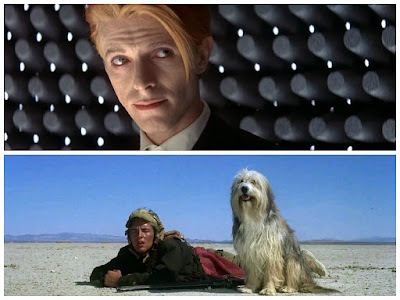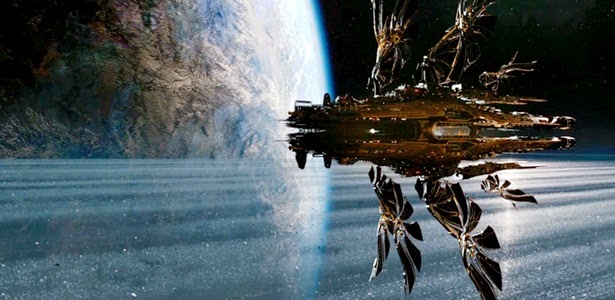A few words on Season 1 of
Revolution, which is a strange beast , where many of USTV drama’s finest qualities compete with the dumbest.
It builds a strong foundation for its story – an America reduced to one great, pre-electric frontier - yet cannot help chipping away at it when it becomes inconvenient. The mood jerks around violently - between a gritty depiction of brutal, lo-tech civil war, and camp, swashbuckling adventure. The writing includes everything from crackling dialogue to eye-rolling, nonsense plot twists. The overall effect is of an intricate house of cards that is painstakingly erected and then smashed apart every few episodes.
Not that this is always a bad thing.
The Lost Firefly
Perhaps its mood swings derive from its wide range of influences, two of which in particular stand out.
Firefly hovers over
Revolution for most of the first season, as a band of desperadoes led by a devil-may-care, wisecracking antihero fight their way around the fringes of an Old West landscape, populated by a reduced future race. Our lead even has a cause with which to be disenchanted, and a tyrannical government force at whom he thumbs his nose. There are subtle differences, but there’s no doubt Matheison trails Mal Reynolds’ shadow about wherever he travels.
Still, Abrams’
Lost is the tomb most raided here, its presence hanging over proceedings like a tapping column of black smoke.
Revolution imitates
Lost's flashback device, but with nothing like the discipline, darting all over pre 'blackout' history with too little patience to flesh things out effectively (and in some episodes not bothering with flashbacks at all).
It strives to emulate that pleasing
Lost meld of supernatural, archaeological and technological mystery, and does a reasonable job, although it has nothing like
Lost’s predilection for denying its audience satisfaction. In fact,
Revolution shows its hand incredibly early – probably out of a lack of confidence. Certainly it is in an incredible rush, as if hyper aware of the threat of premature cancellation. Maybe
Firefly’s fate played on their minds. (Turns out they were right to be
worried)
Cast-offs
Certainly
Revolution is keen to bring in some familiar faces, feeling the need for star power more than
Firefly. Top talent like daughter-slapping, coworker-stabbing, corpse-mutilating Elizabeth Mitchell and priest killing, son-beating, Lionel Ritchie enthusiast, Giancarlo Esposito, are brought in to put bums on seats, and to make us think of other, greater shows.
Still, lead roles are given to fresh faces. Tracy Spiradakos is the highest profile newbie, providing a solid, likable enough lead, helped by writers who know the importance of a good joke, and proper surprises. Baddie in Chief, General Monroe, is a less successful bit of casting. David Lyons occasionally shows he's a strong performer, but he doesn't possess the necessary mass for a character who is supposed to have drawn so many people into his orbit. Once again the impression is that an older, more grizzled figure, with eyes and voice that speak of a history, would have been a better choice.
It’s a similar story with main part, Miles Matheison. Actor Billy Burke has a little more form, having cropped up in
24 (as another Matheson) and in the
Twilight movies. Very often he is almost there - yet the feeling lingers that he's too wiry and slight to carry the weight we're told is on his shoulders, or the responsibilities of a revolutionary leader.
Generally the cast’s gleaming teeth and perfect hair can make
Revolution rather hard to take seriously. You can’t have it both ways: a world where hot water is hard to come by should not be this gorgeous.
Your darlings' mates
Still, you don’t stick with this show if you’re looking for high-brow entertainment. You watch it for sword fights, snappy dialogue and adventure. Oftentimes it can be a delight to sink into a world where electricity is forgotten magic, popular culture is the domain of the middle aged (“what’s a boy band?” asks a teenager) and a Google executive is a helpless, poverty-stricken fool.
Revolution absolutely hammers along, killing if not its darlings, then its darling’s mates, with abandon. Additionally, there are very few of the dead episodes that plagued a show like
Lost; rather each is packed with events: Prison breaks! Drug runners! Turncoats! Amulets! And heaps and heaps of old Holywood swordplay. “You killed my father!” yells each episode. “En Garde!”
And this has its attractions. Coherence goes out the window, but it’s all pretty entertaining. The writers are intent on demonstrating that things are progressing, that it doesn’t intend to hang everything on one increasingly tired mystery.
Tea Party
Instead, they’re keen to expand and explore this world they’ve created. The writers have great fun imagining how the United States might collapse into warring parts, reflecting that US Voter Map - a nation of distinct, warring cultures. Revolution’s new states, the despotic ‘Monroe Republic’ (The North East coast), the part Confederate flagged ‘Georgia Federation’, the barren ‘Plains Nation’, the ‘California Commonwealth’ and amusingly, ‘Texas’, seem a fairly accurate projection of how the US would divide.
The rebellion, an apparently widespread network of goshdarn decent folk, are committed to restoring the Union. And it’s in their story that the show begins to manifest a rather odd ideology.
Perhaps it was inevitable that a show with Revolutionary zeal at its heart would have an uncomfortable relationship with guns. The Limbaughs and Trumps would certainly approve of this future America, where a population is made prostrate to a dictator by being relieved of its weaponry. The message is clearly broadcast throughout the first half of the series: no guns = tyranny. It’s strong enough that an NRA logo in the credits would come as no surprise at all.
Still, halfway through the season the whole 'no-guns rebellion' thing is ditched, so that we can all enjoy some more gunfights.
Even here then, the show doesn’t have the power of its convictions. It’s too intent on ensuring we’re all entertained. That helps the audience forgive the questionable politics, and enjoy the world for what it is: a place where swinging from a chandelier is essential combat training.


































.JPG)
.JPG)
